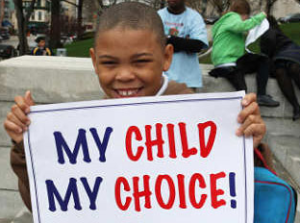Vol. 14, No. 29
PARENTS WANT CHOICE. In times gone by, parents understood that the school their children attended was determined by their zip code and, in most cases, the quality of that school would be driven by family income. The 1960s civil rights movement brought to the nation’s conscious the inequity in educational opportunities for children of color, with their parents demanding better schools. Parents today, from all walks of life, are taking up that dream and pushing for choice in schooling. CER’s Jeanne Allen, at the National Coalition for Public School Options Family Reunion, points out that “everyday evidence grows that demand for school choice is high and that it extends across the racial, socioeconomic, and political spectrum.” Most critical to the success of choice, in all of its forms, is that it is “embraced by the largest and most diverse coalition in recent history” and, today, that coalition is represented by “parents who want – and deserve – the power to choose the best school for their own child,” adds Allen. Parent power at work!
NC AND FL ON BOARD FOR CHOICE. The choice landscape certainly is welcoming in North Carolina and Florida. CER just released survey results that show broad support for school options and new charter schools. Seventy percent of those surveyed in North Carolina support the creation of new charter schools and the opportunity to choose among a wide variety of schools, while 60 percent of those surveyed in Florida do. In North Carolina, the strongest support for charters came from African Americans (85 percent), women (82 percent), and those with school-aged children (81 percent). The Florida poll found that 61 percent of those surveyed agree that charter schools should be funded at least the same as all other public schools. Florida has one













 The strongest critics of choice scholarship programs claim that they violate the First Amendment (establishment of religion) if dollars are used for religiously affiliated schools. The First Amendment provides freedom of religion, not freedom from religion. Choice scholarship programs let parents choose where to direct their children’s education funds. The state is not imposing religion upon its citizens (a concern of the Founding Fathers), nor does offering parents the choice of a religious education for their children substantiate federal funding of religious institutions. As Clint Bolick, Vice President for Litigation at the Goldwater Institute
The strongest critics of choice scholarship programs claim that they violate the First Amendment (establishment of religion) if dollars are used for religiously affiliated schools. The First Amendment provides freedom of religion, not freedom from religion. Choice scholarship programs let parents choose where to direct their children’s education funds. The state is not imposing religion upon its citizens (a concern of the Founding Fathers), nor does offering parents the choice of a religious education for their children substantiate federal funding of religious institutions. As Clint Bolick, Vice President for Litigation at the Goldwater Institute 
